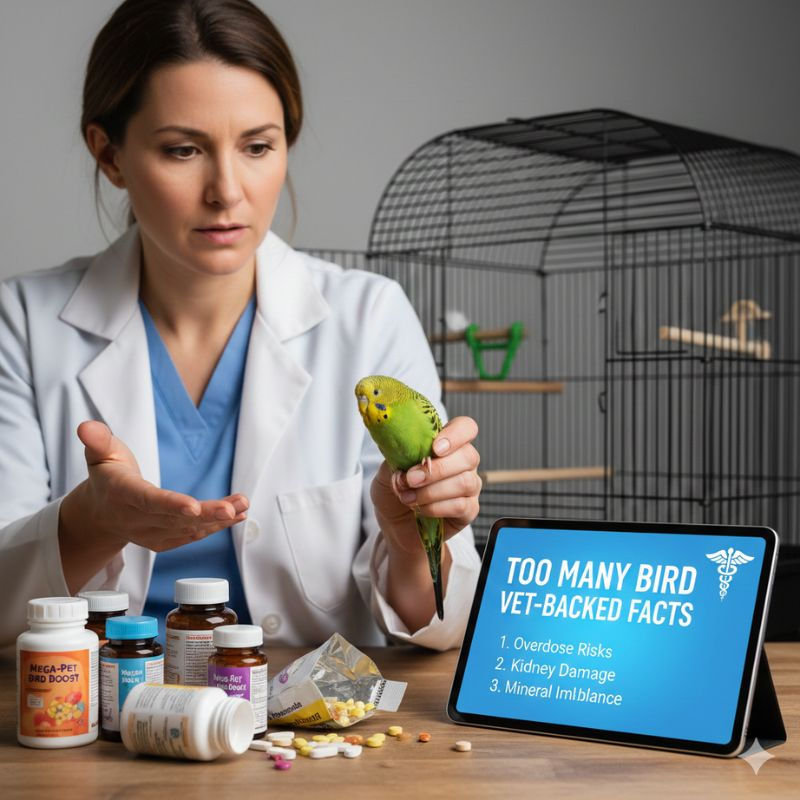The Importance of Keeping Your Bird's Cage Clean
- petperchlove
- Feb 25, 2025
- 3 min read

Keeping your bird’s cage clean is crucial for ensuring its health, happiness, and longevity. Birds are highly sensitive creatures, and an unclean cage can lead to bacterial infections, respiratory issues, and overall stress. A well-maintained habitat promotes a hygienic environment, prevents odors, and enhances your bird's quality of life. In this guide, we will explore the significance of using a bird cage cleaner, how often you should clean, and the best practices for keeping your bird’s home spotless.
Why Regular Bird Cage Cleaning is Essential
1. Prevents Bacterial and Fungal Infections
Bird droppings, leftover food, and moisture create the perfect breeding ground for harmful bacteria and fungi. Regular use of the best bird cage cleaner helps eliminate pathogens that can cause diseases like psittacosis (parrot fever) and avian flu.
2. Reduces Respiratory Problems
Dust, dander, and mold accumulation in a cage can lead to respiratory issues in birds. Certain chemicals and ammonia buildup from waste can irritate their delicate respiratory systems. Proper bird cage cleaning with safe, non-toxic cleaners ensures clean air circulation and prevents lung infections.
3. Eliminates Odors
A dirty bird cage emits unpleasant odors due to decomposing food and waste. Consistent cleaning with an effective bird cage cleaner neutralizes odors and keeps your home smelling fresh.
4. Improves Mental and Physical Health
Birds thrive in a clean and structured environment. A dirty cage leads to stress and can affect their behavior, making them aggressive or lethargic. By maintaining proper hygiene, you create a space where your bird feels safe and comfortable.
5. Prevents Pest Infestations
Unclean cages attract mites, lice, and other parasites, which can harm your bird. Using best bird cage cleaners helps eliminate these pests and prevents infestations that could compromise your bird’s health.
Best Practices for Bird Cage Cleaning
To ensure effective bird cage cleaning, follow these best practices:
Daily Cleaning Routine
Remove uneaten food and change the water daily to prevent bacterial growth.
Wipe perches, toys, and food dishes with a bird cage cleaner.
Spot-clean droppings to prevent buildup.
Weekly Deep Cleaning
Take the bird out and place it in a safe space.
Remove and wash all cage accessories (perches, toys, food bowls) using the best bird cage cleaners.
Scrub cage bars, tray, and grates with a mild, bird-safe disinfectant.
Rinse thoroughly and allow everything to dry completely before reassembling.
Monthly Disinfection
Use a deep-cleaning bird cage cleaner to eliminate bacteria and fungi.
Check for rust, broken toys, or damage and replace if necessary.
Rotate toys to keep your bird engaged and prevent boredom.
Choosing the Best Bird Cage Cleaners
When selecting a bird cage cleaner, prioritize the following:
1. Non-Toxic and Bird-Safe Ingredients
Avoid cleaners containing bleach, ammonia, or artificial fragrances, as these can harm birds. Instead, opt for enzyme-based or natural cleaners.
2. Antibacterial and Odor-Eliminating Properties
A good cleaner should effectively kill bacteria and neutralize odors without leaving harmful residues.
3. Easy to Use and Rinse
Choose a spray or liquid cleaner that can be easily applied and wiped down without excessive scrubbing.
4. Eco-Friendly Options
Many best bird cage cleaners are biodegradable and environmentally friendly, ensuring they are safe for your bird and the planet.
DIY Bird Cage Cleaner Recipe
For those who prefer natural solutions, you can create a homemade bird cage cleaner using:
1 cup white vinegar
2 cups water
1 tablespoon baking soda
A few drops of lemon juice (optional for freshness)
Mix the ingredients and use a spray bottle to clean surfaces effectively. Rinse thoroughly before placing your bird back in the cage.
Final Thoughts
Maintaining a clean bird cage is vital for your pet’s health and overall well-being. Using the best bird cage cleaners and following a proper bird cage cleaning schedule ensures a hygienic, odor-free, and stress-free environment for your feathered companion. By incorporating safe cleaning practices, you can significantly improve your bird’s quality of life and longevity.
Frequently Asked Questions (FAQs)
1. How often should I clean my bird’s cage?
Daily spot-cleaning is essential, while deep cleaning should be done weekly. A thorough disinfection is recommended at least once a month.
2. Can I use vinegar to clean my bird’s cage?
Yes, vinegar is a natural disinfectant and safe for birds when diluted properly. However, ensure the cage is well-rinsed before returning your bird.
3. What happens if I don’t clean my bird’s cage regularly?
Neglecting cage cleaning can lead to bacterial infections, respiratory issues, pest infestations, and stress-related behaviors in birds.
4. What are the signs that my bird’s cage needs cleaning?
Bad odor, visible dirt, mold, food buildup, and increased pest activity indicate that the cage requires immediate cleaning.
5. Can I use regular household cleaners for bird cage cleaning?
No, many household cleaners contain toxic chemicals harmful to birds. Always use bird cage cleaners specifically formulated for avian environments.



Comments